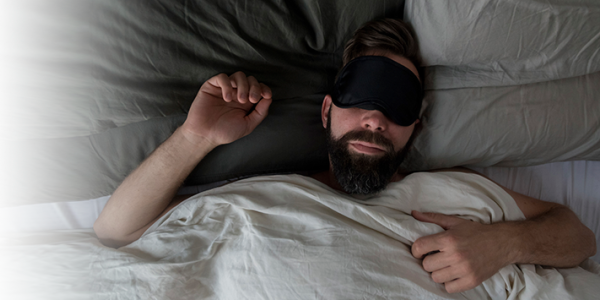
請點擊此轉換成中文
More than 60 years ago Audrey Hepburn donned an eggshell blue eye mask in "Breakfast at Tiffany's" and a whole generation of women suddenly wanted to sleep in the same glamorous style. Decades later, we now know that an eye mask is much more than just a fashion statement. In fact, it could be the easiest step you can take for a better night’s sleep! Eye masks have declined in popularity over the years, but new research is making this cheap accessory the new must-have item for better sleep and possibly improved brain health. Read on to find out why.
By now we all know that sleeping in a dark room is a best practice for good sleep hygiene. But unless you sleep in a cave – or in a room with black-out shades and zero electronics – chances are your eyeballs are exposed to more light than you think. From the tiny light on your cell phone charger to a dim nightlight in the bathroom down the hall, even this small amount of light can bypass your closed eyelids and hit your retinas. The results can be significant and even dangerous sleep disturbance. In fact, recent studies have shown that minimal light exposure at night suppresses melatonin production, and increases your risk for cardiovascular disease, diabetes, insulin resistance, obesity and even depression.
Fortunately, there's an easy, cheap solution that you can try starting tonight. All you need is a simple well-fitting eye mask. You don’t have to spend a lot of money, but you also shouldn't rely on the freebies you may have collected from the airlines over the years. Those are certainly better than nothing when you’re trying to get some shut eye on an overnight flight, but they aren’t generally substantial enough to do the job, and the loose fit can still let in too much light. Instead, look for a mask that:
- Blocks out all light. Try the mask on during the day or in bright lights. If you can see any light coming through (even just shadows) it's not going to work. Look for double layers of a thick weave to ensure no light gets through.
- Is made of soft and breathable fabric. First and foremost, the mask has to be comfortable! Silk masks are especially smooth and breathable, and won’t feel hot when pressed against your skin, which is especially important for side and stomach sleepers.
- Adjustable fit. You need the mask to be tight enough to keep the light out around the edges, but not so tight that you feel pressure on your forehead or eyes. An adjustable strap is ideal for ensuring that you get the perfect fit.
- Easy care. Your mask will be touching your face for (hopefully) 8 hours every night, so you need to wash it every few nights. Look for models that be thrown into the washer and dryer and are durable enough to stand up to several months of use.
Still not convinced that such a simple accessory could make a big difference. Consider this: A study conducted at Cardiff University showed that wearing an eye mask at night could improve certain brain activity – including learning, memory and alertness. Interestingly, those involved in the study didn’t demonstrate an improvement in the quality or quantity of their sleep, but their brains clearly benefitted from the darkened environment.
With so many benefits and virtually no risks or drawbacks, isn't it time to try an eye mask? Waking up more refreshed – and with a brain that’s primed for the day ahead – should be all the motivation you need!
This article appeared in the March 2024 edition of the HealthPerks newsletter.

